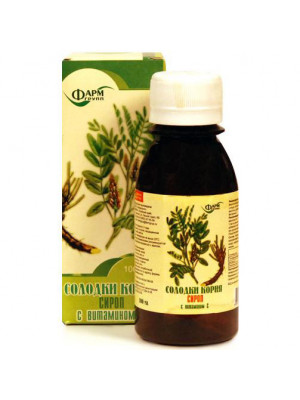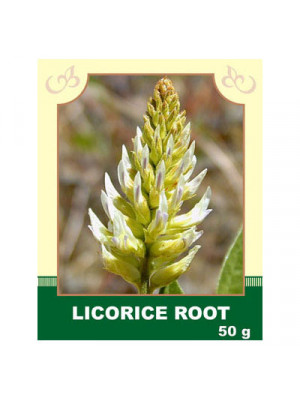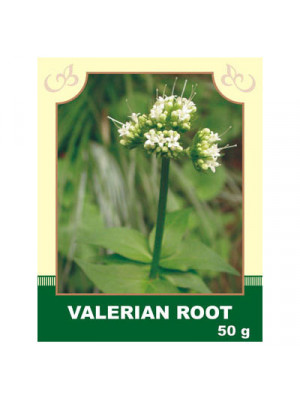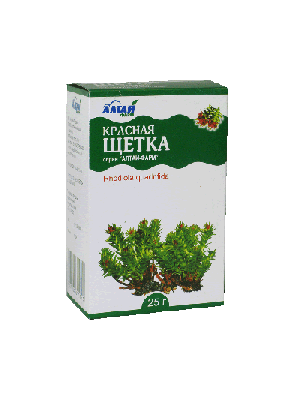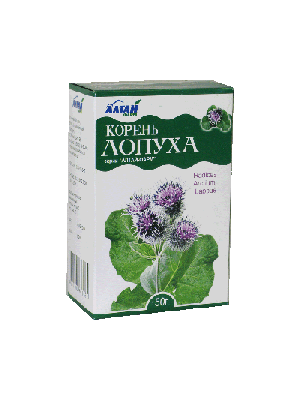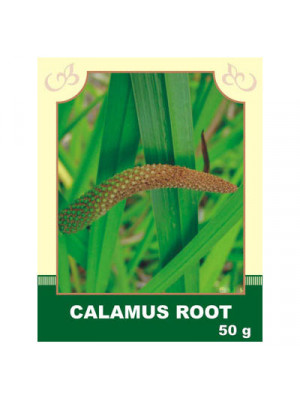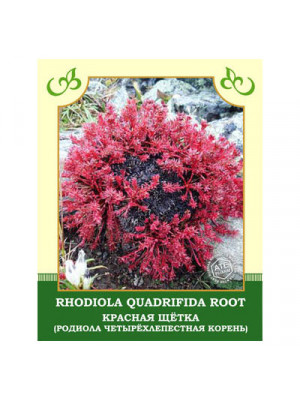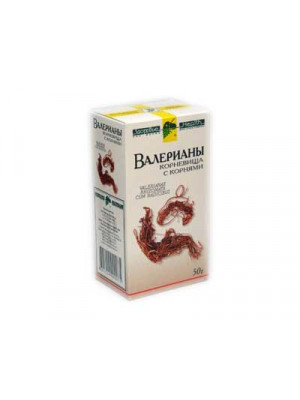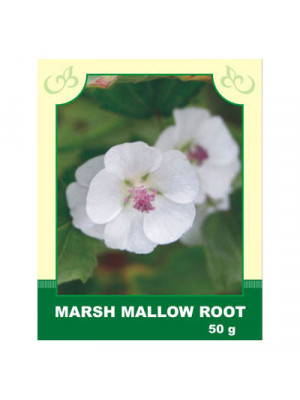Search results for 'hellebore root'
- Syrup liquorice recommended as biologically active food supplements - the source of glycyrrhizic acid, an additional source of vitamin C. Syrup of liquorice is used in inflammatory diseases of the respiratory tract, accompanied by a cough with difficult expectoration. Glycyrrhizic acid has antimicrobial activity against a number of pathogenic microorganisms (Staphylococcus tuberculocidal, E. coli); increase nonspecific resistance of the organism. Glycyrrhizic acid, stimulates the body's own interferon, which greatly increases the body's defenses and immunity.$8.99
Internally: Taken as an expectorant for lung diseases accompanied by cough; as an anti-inflammatory spasmolytic for gastritis, peptic ulcer of the stomach and duodenum; as a laxative and regulating water-salt metabolism in diabetes; as part of medicinal mixtures as a diuretic and laxative.
Method of application and doses: 1 tablespoon of raw material is poured with 200 ml of boiling water, boiled for 15 minutes in a water bath, infused for 45 minutes, strained, squeezing out the remaining raw material. The ready infusion is brought to the original volume with boiled water and taken in 1 tablespoon 3-4 times a day.
Contraindications: Individual intolerance, pregnant women. Prolonged use is not recommended.
$5.99Internally, aqueous infusion and alcoholic tincture of the rhizomes and roots are used as a calming remedy for nervous excitement, insomnia, asthma, palpitations, seizures, spasms, hysteria, neuroses of the cardiovascular system accompanied by pain and spasms of coronary vessels, for nervous diseases of the stomach and intestines, skin diseases on a nervous basis, and other nervous disorders. They are also used for headaches of nervous origin and inflammation of the sciatic nerve.
Method of application and dosage: 2.5 tablespoons of roots are poured with 200 ml of boiling water, infused for 45-60 minutes, strained. Boiled water is added to the obtained infusion to the original volume. Take 2-3 tablespoons 3-4 times a day, 30 minutes after meals. Tincture: 1 part valerian roots and 5 parts 70° alcohol or vodka, infuse for a week, strain. Take 15-20 drops 3-4 times a day.
Contraindications: Individual intolerance. Nausea and vomiting may occur in case of overdose.
$6.99- Description. Rhodiola quadrifida is an exquisite gift of nature, which helps to restore all the functions of our body. This plant is absolutely unique and it doesnt have any analogues in the whole world. Rhodiola quadrifiga is rich in tannins, organic acids, volatile oils, proteins, oils, wax, manganese, zinc, chrome, cobalt, gum, silver and many other. The plant has powerful styptic and tonic effect. It helps to reduce brain vessels spasms.Rhodiola Quadrifida due to its high bio-activity is an excellent support for mens health!
Use. Rhodiola is widely used in folk medicine for female diseases of different kinds (erosion, sterility, dysfunctional womb bleedings, endometriosis, myoma) as well as endocrine disturbance and thyroid gland diseases. Rhodiola quadrifida is especially valuable for potency weakening, menstrual cycle disorders, menopause, mestopathy and other hormone disorders. This herb also helps to speed up healing of fractures, raises mental and physical efficiency, enriches blood composition. The herb is recommended by herbalists for oncological illnesses. But you should be very careful about it, if you have such problems as increased blood pressure and psychic excitement.
Attention! Before using any herbal products, make sure that you have full knowledge of how the herb works and any adverse reaction it may cause.$7.99 Internally, the root is taken as a diuretic and cleansing agent in the following cases:
- For diseases of the urogenital organs;
- In gout, rheumatism;
- In diabetes;
- For hemorrhoids;
- In chronic constipation;
- For menstrual irregularities;
- In the treatment of skin diseases;
- For allergic reactions.
Method of application and dosage: Steep 1 tablespoon of roots in 200 ml of boiling water, heat in a water bath for 30 minutes, infuse at room temperature for 10 minutes, strain. Bring the infusion to the original volume with boiled water and take internally 1/2 cup 2-3 times a day before meals.
Externally, the root is used:
- Against hair loss and dandruff;
- In the treatment of eczema, ulcers, and purulent wounds;
- For inflammatory processes of the mucous membrane of the oral cavity, throat.
Steep 1 teaspoon of roots in 400 ml of boiling water, infuse for 8-10 hours.
Contraindications: Individual intolerance.
$6.99Internally, it is taken as a binding agent for stomach disorders, inflammation of the intestines, heartburn, and lack of appetite; for neurasthenia, convulsions, osteitis, bronchitis, pleurisy, diseases of the biliary tract, and in gynecology - for libido weakness, regulating the menstrual cycle, and enhancing sexual activity.
Method of application and dosage: 1 tablespoon is poured with 200 ml of boiling water, covered with a lid, and heated in a water bath for 15 minutes. Cooled for 45 minutes at room temperature, strained. The volume of the resulting infusion is brought to the original volume with boiled water. Take 1/4 cup 3-4 times a day 30 minutes before meals.
External use: applied for baldness and hair loss; for rinsing the oral cavity with stomatitis.
Contraindications: individual intolerance, during pregnancy, and with increased secretion (acidity) of the stomach.
$6.99Internally, it is taken for weakened potency, infertility (both male and female), sexual coldness, ovarian and testicular cysts, impotence, mastopathy, polycystic ovary syndrome, and fatigue. It improves mental and physical performance, recommended for oncological diseases, enhances blood composition, increases resistance to infectious diseases, and promotes rapid bone fusion in fractures.
Method of application and dosage: 1 tablespoon of crushed root is poured with 250 ml of boiling water. Heated in a water bath with a closed lid for 15 minutes, stirring frequently. Infused for 45 minutes at room temperature, strained. Bring the decoction to the original volume with boiled water and drink 3-4 times a day 30-40 minutes before meals with 1 tablespoon of natural honey. The course of treatment is 30-45 days. Store the decoction in the refrigerator for no more than 2 days.
Contraindications: individual intolerance, pregnant and lactating women, patients with hypertension, fever, mental excitement. Cannot be used in combination with hops and licorice.
$8.99- The properties of Marshmallow are anti-inflammatory and coating. Marshmallow also helps to boost the immunity at cellular level. Marshmallow is used internally to treat inflammation and ulceration of the digestive tract, oral and pharyngeal mucosa with associated dry cough. It relieves irritation of the mucus membranes of the mouth, throat and gastrointestinal tract and helps with respiratory complaints including bronchitis and asthma. The polysaccharides form a protective film over inflamed and irritated mucosal tissue. Marsh Mallow Root is often used for eyes inflammations as a wash.$6.99
- Valerian has been used as a sleep aid for over 1,000 years. This herb is a native plant both of Europe and North America. Valerian roots are often prepared in tea form, and in doing so they should not be prepared with boiling water, as this may drive off the lighter oils. Its ability to help relax the central nervous system, promote feelings of calm, decrease levels of anxiety and stress, and enhance sleep are known to millions the world over. Unlike some prescription sleep aids, valerian is not known to cause morning grogginess and is non-addictive.$7.99
Internally, it is taken as an expectorant, anti-inflammatory, and enveloping agent for bronchitis and bronchial asthma, gastritis, colitis, stomach ulcers, and duodenal ulcers; for inflammation of the bladder and urinary incontinence.
Method of application and dosage: The infusion is prepared by the cold method: 6-8 g of crushed root are infused in cold water for an hour, strained, and sweetened with sugar or honey. Take 20 g every 2 hours.
External use: used for gargling and lavage in inflammations of the mucous membranes of the mouth, angina, stomatitis, and on the genital organs.
Contraindications: individual intolerance.
$6.99


